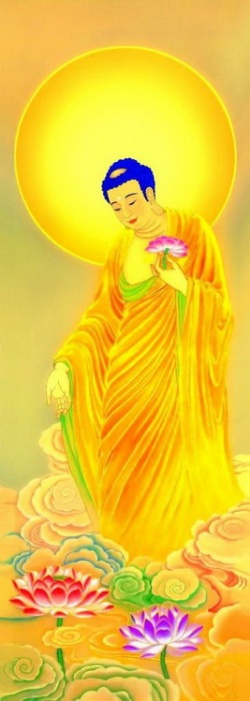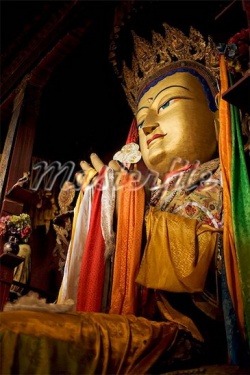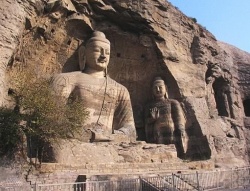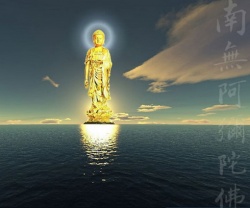The Will to Meditate
Kamalashila
If you ever visit India, you may perhaps visit the FWBO retreat centre in Bhaja. Here, situated inland from Mumbai in Maharastra, are some of the oldest rock-carved Buddhist caves in India. They are dated from second century BCE, just two or three hundred years after the Buddha; and a large community of monks lived and practised the Dharma in them. One of the caves, carved deeply into the stone of the cliff, is rather difficult to get inside, because it is filled with perhaps a dozen or so great dome-like stupas, or reliquary monuments. Each stupa has been carved out of the solid rock, and each is, as I remember, some ten feet high. The roof of the cave is no higher than the stupas, and they are close together. You can just about squeeze around them. It’s quite clear that this cave is intended for occupation not by human beings, but by stupas, or more likely the Enlightened beings which the stupas represent. At one end of this stupa cave one can see a relief has been carved deep into the rock. It’s quite worn, but the relief clearly depicts three Buddha figures. One is the Buddha, Sakyamuni, representing the Enlightened understanding. One is Padmapani, representing Enlightened emotion, or compassion. And one is Vajrapani, representing Enlightened energy, or volition.
In the much later Tibetan tradition, we find the same qualities associated with three Bodhisattvas: Vajrapani is still there, but Manjusri has taken the place of Sakyamuni and Avalokitesvara has taken the place of Padmapani. These three qualities, cognition, emotion and will, are the main aspects of what we call Going for refuge to the ‘Three Jewels’. Which means the decision to make a commitment to the Buddha, or ideal of Enlightenment, to the Dharma, or practice leading to Enlightenment, and to the Sangha, or the community of practitioners moving towards Enlightenment. This decision to make a commitment, this ‘going for Refuge’ to the ‘Three Jewels’, is what everyone is doing, at one level or another, at each stage of the Buddhist path. Even at the most rudimentary level. Even if we simply think of Buddhism as a good thing, think it’s probably a good thing to do, without any practice, or even any knowledge of what Buddhism actually teaches. I say this because can remember that when I was a young teenager, I had something like this rudimentary appreciation of Buddhism. I think I was 13 or 14 when I bought a compilation of poetry called Zen Flesh, Zen Bones. I was on holiday with my parents. It might even have been my last holiday with them, because I was growing up and soon I would find it terribly boring for me to be at a seaside resort with my parents. On that same holiday I also remember deciding to buy a spy thriller by Ian Fleming. James Bond novels, though not yet films, were just starting to get popular. James Bond was much more my style, at least it was in my own mind. I didn’t make much headway with the Zen poetry. But I do remember that I had a certain feeling of approval of Buddhism — even though I knew nothing, absolutely nothing, about it.
Just eight or nine years later, in London, I discovered all about Buddhism when I discovered that I was living in the next street from a Buddhist monk called Sangharakshita. It was 1972. My background was art school and the somewhat wilted petals of Flower Power. Tibetan Yoga and Secret Doctrines had introduced me to Buddhism. A Survey of Buddhism was about to change my life. It was reading books like these, and meeting the remarkable people who came and went from Sangharakshita’s flat in Muswell Hill, that made me want to practise Buddhism and bring it alive for myself. Of course, in spite of my reading I didn’t have much of an idea of how actually to do that. But now I had gained a far deeper appreciation of Buddhism than I had before.
So it’s when we decide to take up the practice of Buddhism, even if in a rather provisional way — perhaps sometimes doing a bit of meditation, sometimes reading a book, sometimes doing a puja — that this process Buddhists call Going for Refuge, can start to go deeper. Yet we haven’t made any final decision about whether or not Buddhism is the path for us. Such indecision may go on for some time. In my case, it went on for about a year, a comparatively short time. But I was young, completely unattached, very independent. In those days it was easy to be independent, but even so I found independence uncomfortable. I had phases of coming along to the centre, phases of spending time with my hippie friends, phases of just being on my own.
At such a time in one’s life, all kinds of things may be going on inside. For example, we may only have discovered Buddhism very recently. So we haven’t got to the point where we could expect to make that final decision, to really go for spiritual development. Our commitment is still provisional. At the same time, our feelings about it may be quite strong. We may be thinking very much about it. But finally making that decision does make a big difference.
This is because decision-making brings clarity. I mean decisions about anything — not just about weighty matters like Buddhism. Indecision, of its very nature, cannot help but generate a certain amount of confusion. Yet clarity doesn’t necessarily come from making snap decisions. So this is one of our greatest problems. It isn’t easy to make decisions, yet we have to make them, even though we often don’t know how to go about it. Sometimes we are put off by the complexity underlying the choice we have to make. On the other hand, sometimes we are put off by the stark simplicity of the issue. We think, Oh no, it’s so black and white, do I have to go this way or that way? Can’t I do both, can’t I do a bit of this and a bit of that as well? Well, of course, it depends. Maybe that would be a good decision. Then, maybe it wouldn’t be a good decision. It’s so hard to tell sometimes. Within certain limits, we are all free to do what we like, we’re all free to make our own choices. It is characteristic of human nature that we are usually conscious enough to see that a choice is possible. Humans can even make a decision which goes against what they want — they can go on a diet, for example, and eat food they don’t want to eat, and not eat food they do want to eat. In other words, they can want what they don’t want.
But this freedom, like all freedoms, is really also a responsibility. We tend to want freedom without responsibility, but life just isn’t like that. Hidden behind the freedom of choice is the responsibility to make a choice; the fact that we have to make one. So when we notice that, we often put decisions off, or pretend to ourselves that a decision doesn’t have to be made. The usual reason why we avoid a decision is that we know some action will be required as soon as we make it. So we sit on the fence, unwilling to jump down into the action. We try to make ourselves as comfortable there as we can. We can even forget that we are doing it.
I know, because when I was 23 I had a whole year of sitting on the fence. Instead of moving into the community in Archway, London, where the first FWBO centre was, I started my own non-FWBO community in the same street. In my community was another chap in a very similar position to me; we both wanted to live close to the centre, because we liked what went on there. At the same time, we didn’t want to cross that line into complete, total immersion in the FWBO. It wasn’t long before I left that community, got a job and moved back to my single bed-sit in Muswell Hill. Then again, just a few months later, I left my job (jobs seemed to be no problem in those days), and started another non-FWBO community. At the time, each of these solutions seemed like a progression on from the previous situation, but I can see now that I was circling round the FWBO; I didn’t really know what I wanted.
The problem is that our actions have all kinds of consequences. The decisions we make will clearly affect our lives. So we can become wary of decisions. The trouble is, not making a decision also has all kinds of consequences. We know that making a poor decision will have consequences, that making a good decision will have good consequences. And the situation is not simple. Many consequences are likely to follow, good and bad, which we cannot anticipate in advance.
So how are we to assess what makes a good or a bad decision? Well, it’s obvious. We can look at the consequences. Ask ourselves in hindsight, how did that way of doing things work — did it achieve what we wanted, did it make anyone happy? Did any extra consequences result from it? We learn about life from our experience of decision making. Learn from experience that fire burns and that burning hurts — and that we don’t like to be hurt. We therefore become careful about fire, and other potential sources of pain. We carry on learning throughout our whole life. Learning from our good decisions, unfortunate decisions, disastrous decisions. We are changed by those decisions: we make progress by making better decisions. We degenerate when we do not learn from our mistakes.
Clearly, such progress is also an aspect of spiritual life. It is the spiritual life itself. Spiritual progress takes place because of our decisions. We reach an effective level of going for Refuge when our decision to commit ourselves to a Buddhist path becomes definite; it is only then that we can start to make a thoroughgoing effort to transform ourselves through the practices of Buddhism.
Quite a few of us here tonight will recognise what I am saying from their own experience. But I wonder if they have considered that much of that transformation has come about through their exercise of the will? I’ve been talking in terms of decision making. But a decision is about what we decide we want to do, or wish to do. This kind of terminology, the terminology of the will, gives us a useful viewpoint on our decision making. It’s a more direct viewpoint: now we can check our decisions, not just by hindsight, but when we actually make them. We can check what our volition is, check the will behind the action, even check it before we do an action. We can ask, is this action rooted in skilful attitudes, or in unskilful ones? Rooted in love, in patience, in wisdom? Or in greed, in hatred, or in delusion? What is our actual experience, how do I feel as I’m doing this? What, in fact, am I actually doing? It is this, the root of our volition, which will determine the outcome, in terms of the mental state it tends to encourage, the mind-set which we end up in later on. This is what is important for Buddhist practice. We are concerned with transforming our mental states and emotions.
This mindfulness of mental states, and transformation of mental states, is the main Buddhist practice. We very likely have the experience of maintaining skilful states of mind consistently, perhaps for some time — say, on a retreat, where conditions are good for meditation. However, eventually we do fall back, at least from time to time, into reactive, unskilful, problematic, or even destructive states of mind. But why is this? It’s sometimes explained as a kind of gravitation which pulls us back into a relatively ordinary state of consciousness. That’s how it can feel. But it would be just as true to say that at that time, that state of consciousness was what we actually wanted. It isn’t that we don’t want to make spiritual progress and to move beyond unskilful states of mind. We do want that. But sometimes we also want not to make spiritual progress. Sometimes we want to be in a reactive state of mind. At that point, that is the state of our will, that is the state of our volition.
As a volitional being, we are pulled around by various conflicts. I Sometimes we want contradictory things, things that can’t exist at the same time. We want to do something, and at the same time, in another compartment of our being, we don’t want to do it. Perhaps, like I did, you want to be a Buddhist, and at the same time you don’t want to be a Buddhist. One way or the other, all this needs resolving. Our wanting is an area in which we need to become more actively aware. Because if we look, we will see that there is willing in everything we do. Some kind of desire is operative in every moment. Perhaps good, perhaps not so good; perhaps useful, perhaps destructive, perhaps also very vague and unclear — but all of it is what we want. And, of course, wanting is where our energy is. Our energy is fuelled by desire. If we really want something very, very much, and an opportunity arises actually to get it — all at once, our mind becomes quite clear. It doesn’t matter if we’ve had a hard day and we’re tired. All the energy we need becomes available.
We can say that the spiritual path consists in channelling the energy of our desire into increasingly skilful channels of activity. The Buddha says in the Dhammapada,
Those who make channels for waters control the waters; Makers of arrows make arrows straight; Carpenters control their timber; And the wise control their own minds.
We channel our ordinary activity, channel our mental activity. In particular, we do this in meditation. Because our meditation is essentially a harnessing of the energy of our will in order to go more and more deeply towards the ideal state of being: the state of being exemplified by the Buddha.
Since Buddhism lays such stress on volition, it is not surprising that there is quite a variety of traditional terms we can use to discuss it. One of these is cetana. Cetana is usually translated as ‘will’, or ‘volition’. But our word ‘will’ suggests something conscious and considered. In the mid-thirties, the German Nazis produced a film called The Triumph of the Will, full of parades of military power. I think that image of will affects us nowadays: we tend to see will as a superimposed force. Collins Dictionary defines it much more mildly and reasonably, as ‘the faculty of conscious and deliberate choice of action’. But Buddhism sees our will taking shape at a deeper level, as something predominantly unconscious. Our conscious intention is not excluded, but it is seen as closely tied in to unconscious drives. So cetana means the total energy of the psyche, not just the energy available to our conscious mind. It is the whole force of our being as it constantly moves towards this, or that, object. Cetana is said to operate in every single moment of our existence. That element of desire, that wanting, wishing, preferring; preferring to repeat the experiences we find pleasant, preferring not to experience those we find unpleasant. Cetana continually goes for what it wants. I say ‘it’; but in fact this element of ‘drive’ is essentially us — if anything is us. We are a drive; we are what drives towards some particular direction. Another common Buddhist term for the will is samskara. This is sometimes translated as ‘steering forces’ or ‘drives’, so in many ways is synonymous with cetana. But samskara refers more to the emotional dispositions we inherit from our past conditioning. Maybe we are fearful, retiring and timid; maybe we are jolly, loud and overbearing. Maybe we’re an introvert, maybe we’re an extrovert. All these emotional tendencies are samskaras. All the different emotions we produce are samskaras. In fact we can say that we’re in the habit of producing, or responding with, particular emotions. So sometimes samskara is translated by the phrase, ‘habit-energy’. We’re disposed to act in particular ways because we’ve got into particular habits. So samskara is the whole habit-forming tendency that drives us along, and which we go along with, conditioning our future.
Finally, the last term is karma. Karma is moral action. Not just action, but action seen from the point of view of its conditioning effect. If I suddenly break out in a fake Brummie accent, that would be an action. But what effect would it have? Well, it would depend on my real motivation for doing such a thing. Maybe I might want to amuse you. Maybe I am even anxious to amuse you, and maybe I think me speaking in that way is going to be a really, really funny thing to do. If it actually was funny, I’m sure that would be fine, from your point of view. You are responsible for your own responses — that’s up to you. But what happens to me, if I act out of an anxious desire to please others? I imagine that that habitual attitude would be strengthened. Whatever the response of my audience, however good natured and appreciative they are, I will be encouraging myself in becoming just a little more anxious and eager to please.
So this is how karma works; we become the rather fixed personalities we often are by constantly repeating actions which encourage particular tendencies. We are the tendencies, we are the drives.
Karma is moral action, then; the effect our action will have depends on whether it was originally rooted in skilful or unskilful mental states. Unskilful mental states, like the kind of craving I might have for you to like me, will have an unwholesome effect — in this case, I become an increasingly needy person. Skilful mental states will have a wholesome effect. If for example we constantly act out of a genuine desire to help and befriend others, we become friendlier, more helpful people. This is how morality works. Morality is not doing what you are told. Morality is the process of becoming what you want — that is, becoming what you want, for better or worse.
Karma is often explained as conscious or willed action. But consciousness is a relative thing; it is usually not simply that we are either conscious or unconscious. So how conscious must an intention be for it to condition an emotional habit? We can see from our experience that habits start as more or less conscious actions, and they end up as unconscious tendencies. Buddhism divides karmas into three basic kinds. First there are those decisions which place the mind into a particular groove or channel of activity for the first time. For example, at some point we had our first taste of chocolate. A completely new experience. Our choosing to eat chocolate that first time is an example of an action which is done once. It is called residual, or ‘one-off’ karma. Then there are those actions which are repetitions of the original action, when we place the mind again and again in a familiar groove. In terms of our example, this would mean once again eating chocolate; or it could mean thinking about eating chocolate, dwelling mentally on the possibility, repeating it again and again. So this kind of activity is called ‘habitual karma’, or we could call it ‘deepening the groove’. A third kind of karma is called ‘weighty’ karma. This is because of the very special kind of groove into which we place the mind. It could be the dhyana groove, for example. The experience of higher consciousness developed in meditation is traditionally considered to be a very skilful weighty karma. The habit energy, the overall effect on our drives and tendencies afterwards, is very profound. There are also, of course, negative weighty karmas. Causing another’s death is an example, since the mental volition is almost inevitably very negative: it’s not something we could easily forget.
So these three kinds of action determine to differing degrees what we become in the future. The weighty actions we have performed will have the dominant effect on our mind-stream. After that it’s the habitual actions, and then the residual or one-off actions. But we probably haven’t performed many weighty actions, positive or negative — if any. So it is our habitual karmas which will have the most effect. We might be thinking that all those one-off actions must surely have built up a huge momentum, but in fact these will rather tend to cancel each other out.
Because it is not that every action will always have an effect. It is not that we are doomed to experience the reverberations of every last one our actions, down to the end of time. A karma is like a seed sown in a field, the field of our mind. It is ready to germinate as soon as the conditions are right. But if those conditions never arise, the seeds may never germinate, and in some conditions, the seeds can be destroyed. This goes for good and bad karmas. Our practice can sow good seeds and dig out the bad. Skilful actions counteract the effects of unskilful actions, and vice-versa.
There’s another important point about karma. Our intentions always produce some karmic effect. But not everything we experience is the result of karma. Other things can affect us. Traditional Buddhism lists the physical, that is to say chemical and biological, conditions, and also our psychological conditioning. So we should always check for these before concluding that what we are experiencing is a result of karma.
Buddhism operates within this perspective of karma-cetana-samskara. It is about transforming all our forces of unenlightened habit, into new ‘habits’, to use that word, which are in accordance with ultimate reality — which are informed by enlightenment. And it is through the will, or karma-cetana, that we form habits, good and bad.
We don’t usually think of meditation in terms of the will. But maybe that is because there is a misunderstanding. Meditation is not a question of exerting will-power in order to forcibly fix our attention. The will is involved; but it cannot be forced. Wilful or headstrong attempts at concentration simply do not work — even though we do sometimes meditate in this way. We can hardly help doing so, when we still do not fully know ourselves. It is when we are temporarily out of touch with ourselves, unmindful of ourselves as a person with different parts and aspects, that we try to concentrate in a forced kind of way. We forget that we are not simply a fixed personality. We strongly identify with that aspect of ourselves which very much wants to concentrate the mind. With great enthusiasm, we try to will ourselves to concentrate. However, the will does not triumph. Sooner or later, other suppressed parts of ourselves emerge, and insist on having a say. And some of them may be very, very uninterested in meditation or spiritual life. No doubt some of you have had some experience of this personally. I know I have. So with growing mindfulness we learn how to incorporate all these parts of ourselves into our overall growth and development. It’s important to have this idea clearly in perspective, because my impression is that the notion of wilful meditation sometimes has the effect of inhibiting people from making a really strong effort. Providing we have started to get to know ourselves to some extent, and are open to the possibility that there is still much more to discover, then ‘wilfulness’ is unlikely to present a lasting problem in meditation. We just need to learn how to spot the signs of wilful practice and use that awareness to change our meditation strategy as necessary.
Viewing meditation is an exercise of the will has a very direct bearing on the whole way we approach meditation. But this needs to be understood in a wide context. We shouldn’t think of meditation too much in isolation from the rest of our Buddhist life, for example our ethical practice. The quality of our practice of meditation is dependent on our ethical quality. And any degree of insight depends on the quality of our meditation. And voltions run all the way through these areas of ethics, meditation and insight. Why do we act in a particular way? It’s because the major part of us wants to do it like that. That’s the state of our ethics, our sila. And because we want that, we tend to manipulate the world around us so that we are more likely to get that. That manipulation can be for a skilful purpose, as well as an unskilful one. We have to spot the root of the action, the underlying volition: then we may be able to take initiative, to act more skilfully, and then we’ll be happier. And if we are happier, in positive mental states, we’ll certainly find concentration and meditation a lot easier. So in this way, ethics underpins our state of mind. If we are generally more aware of what we are wanting, what we are really trying to get from our actions, day in and day out, then we’ll become increasingly aware of ourselves. In time, we’ll become deeper, more authentic individuals. We’ll become more truthful. And this is mindfulness. Mindfulness is an especially important support for effective meditation. It’s all too easy to think of meditation just as a technique, just a question of concentrating the mind. But meditation is far more than concentration. We should view it as a continuation of ethical volition into the sphere of pure consciousness. Traditionally the first dhyana, the first level of higher consciousness, is described as consisting of concentration, initial and applied thinking, rapture, and bliss. We can start seeing this as a complete definition of dhyana, which it isn’t. Various emotions and volitions, unique to our situation, are also experienced. But even more noteworthy is the basic fact that there are emotions in a state of higher concentration. These are samskaras. They are volitions. Rapture and bliss aren’t just things we passively feel, they are also things we are doing; they are an example of that quotation I gave from the Buddha in the Dhammapada — a deliberate channelling of our energy towards something higher. They are karmas — willed mental activities — and they have highly positive karmic consequences.
But as well as providing an opportunity to create skilful weighty karma, meditation is also an opportunity to create skilful habitual karma. Think of all those hours you’ve spent on a meditation cushion, trying to meditate — even if you’ve not always been in a higher state of consciousness, you’ve been trying. The intention was there, the will was there. Well... maybe sometimes it wasn’t really there. But on the whole, the repetition of practice has its own very positive effect. Traditionally, a large amount of one’s life spent meditating might well result in a rebirth in the deva realms, just as a life spent in intense competitiveness would tend one towards the asuraloka, and intense greed and craving, towards the realm of the hungry ghosts. Looked at like this, it is almost possible to calculate one’s likely future existence by counting up, in one’s life, the amount of time spent on, and the intensity of involvement in, various activities. This is why so much stress is laid on constant repetition-of mantras, pujas, meditation practices, giving dana; or again, the legendary Bodhisattva practising one of the Perfections such as sila, for innumerable aeons. Regularity, constancy of practice, means that one is definitely modifying the overall flow of karma. If spectacular results, or even tangible ones, are not experienced at the time of practice, that is not significant — since one is often going across, or even against, the current of ‘habit-energy’. A follower of Tibetan Buddhism, for example, by doing a particular practice 100,000 times, is undertaking to spend a significant proportion of his lifetime in a highly skilful way: there will be far less unskilful cetana allowed to flow for many, many hours. And the same principle occurs on a retreat on which there is a regular programme. There are fewer opportunities for unskilful mental action, and for the retreatants a momentum builds up, the effects of which are felt for a long time afterwards.
So in our daily practice, we could probably make the volitions we experience in meditation more conscious, and modify them more actively. What, for example, is the volition we experience in doing the metta bhavana meditation? In terms of a verbal definition, the wish is that all beings should find genuine happiness. But what does that feel like? Do we really want it to happen? If we do, we will want to change ourselves in a way that will help others move towards happiness. In other words, to really reflect that wish for others’ happiness, we must also want to practice ethically. So not just an outward-going wish for others to be happy; there also needs to be an inward-turning wish for ourselves to become more loving towards others.
We’ve seen that, as a general rule, we get what we wish — for better or worse. Wanting can be channelled, deliberately, and we can say that meditation essentially is willing, or wishing. It’s even prayer, though prayer in a strictly non-theistic sense. Creating highly positive habitual karma, if not weighty karma. In Buddhism the idea of making vows or pranidhana is very well developed. We’ve probably heard of the Bodhicitta or ‘Will to Enlightenment’, for the sake of all. But that’s perhaps rather too exalted an example of a vow. After all a vow is essentially a decision to maintain a new level of practice. So if we are moving forward, some kind of vow will be involved. This vowing, or positive wishing or wanting, can be individual, and it can be something many people share. Shared action tends to produce shared results — one day, you’re sitting there wishing you had better conditions for Dharma practice. At the same time, someone else in another part of town is wishing something similar. Two years later, and you’re both living together in a Buddhist community. So spiritual life is the constant willing of the good, the constant determination always to bring about what is skilful, what is ethical. And not just some kind of weak wishful thinking, but a real determination that we, at least, will actively follow the Buddhist path and develop ourselves. With this kind of motivation supporting our meditation, our daily meditation practice will become truly effective.
So to conclude, let’s consider how to put this into practice. When we do our meditation, we can watch out for those three factors which I mentioned right at the beginning: the intellect, our emotion and the will. And we can ask ourselves if we are actually meditating at all. Are we really meditating? Well...
Intellect may well be present; we may well be thinking. But we’ll only be meditating if that thinking is directed towards the meditation itself. Otherwise we’ll just be distracted, wrapping ourselves in a cocoon of woolly thoughts.
Emotion may be present. It will be present, in some form, because it always is. But we’ll only be meditating if those emotions are positive and directed towards the meditation. Otherwise we’ll either be overcome with negative emotions like craving or aversion, or our attention will be distracted here and there by various emotional pulls.
But is the will present? This is the basic question. If it isn’t, we are just passively experiencing our thoughts and emotions as they play themselves like a pre-recorded video. To actually meditate, we need to stop the video and make a fresh start. Meditation is an opportunity to modify the direction that our being has been pointing towards. But we have first to stop the video of habit, or at least start to realise that we are playing it again.
In meditation, we need to tune in to the will, to the directionality of the mind, to the cetana or samskaras or the karma we are creating. Tune into it, and direct it. Direct it towards concentration of mind, tranquillity of mind. Direct it towards insight in to reality. Direct it towards the Buddhas and Bodhisattvas; perhaps towards the three Bodhisattvas who represent the three qualities of purified intellect, emotion, and will. Towards Manjusri, yellow golden orange like the sun, his beauty shining clear in the brilliant blue sky of the mind, deftly using his sharp sword of wisdom, making clear distinctions, revealing the truth of things. Towards Avalokitesvara, the pure white lotus smiling with compassion, beaming gently with positive emotions of love taken to the ultimate depth. And towards Vajrapani, in his two forms, one dark blue-black like a thunder cloud, furious with divine irritation, trampling on the trivia of samsara, breaking through the conflict of faint-hearted doubt and indecision, surrounded by the flames of victory over conflict. And the other form the gentlest pale blue like the evening sky, standing relaxed and calmly smiling, holding a wonderful diamond, radiant, and supremely confident. Vajrapani, the Bodhisattva of enlightened will, has broken through. Now the entire stream of his will is directed towards enlightenment, enlightenment for the sake of all.
Originally published in Madhyamavani: Autumn Issue Two (Birmingham: Madhyamaloka, 1999).










